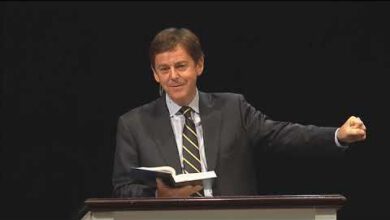The Foundation for Praise
This message by Alistair Begg is shared by Truth For Life. For more information, visit truthforlife.org.
As we turn to the Bible, let us begin with a brief prayer from the Anglican Prayer Book, specifically the Fourth Collect after Easter Sunday. While it may not be the exact day, it’s a meaningful prayer:
“Almighty God, You alone can order the unruly wills and passions of sinful people. Grant that we may love what You command and desire what You promise, so that amid the many and varied changes of this world, our hearts may be firmly fixed where true joys are found, through Jesus Christ our Lord. Amen.”
Now, let me share a reflection. My copy of the Oxford English Dictionary (the two-volume edition) was published in 1993, and interestingly, it dedicates substantial space to defining the concept of self. However, it doesn’t mention the word that was unanimously voted “Word of the Year” in 2013—”selfie.” Incidentally, I apologize for the angle of my camera; my wife says it’s the best view you can have, but there it is. Also, since most of my sermons tend to go in circles, I hope no one minds.
A “selfie” is defined as a photo taken by oneself with a smartphone, typically shared on social media. There are even suggested captions for such photos, like “I was born to stand out” or “Sending my pic to NASA because I’m a star.” Such self-centeredness isn’t new; it’s been on the rise since the Reformation. This shift reflects humanity’s growing confidence in asserting its own will, along with an almost insatiable desire for praise.
This self-focus clashes with a God-centered worldview, which is beautifully articulated in Psalm 8. The psalm begins and ends with the declaration of God’s majesty: “O Lord, You are majestic.” One of the great benefits of being part of a church where the Bible is consistently taught is that it is God’s Word that sets the agenda for both our lives and our worship. In Deuteronomy, God commands Moses to gather the people to hear His Word. The reason we gather in church is to hear and submit to God’s voice.
For example, on the Mount of Transfiguration, the voice from heaven declared, “This is my beloved Son,” but it did not say, “Sing to Him.” Instead, it said, “Listen to Him.” The Psalms remind us that worship and preaching go hand in hand. While we often think praise sets the stage for preaching, it is actually the preaching of God’s Word that provides the foundation for true worship.
Calvin rightly observed that man cannot fully understand himself unless he first looks upon the face of God. It is only through contemplation of God that we can truly see ourselves clearly.
Now, let’s look at Psalm 8, which begins with an acknowledgment of God’s majesty. If you’re following along in your Bible, you’ll notice that the word “Lord” appears twice, with the first instance fully capitalized and the second only the “L” capitalized. This signifies two different Hebrew words: Yahweh, the Sovereign Lord, and Adonai, our Defender God. The first name, Yahweh, is the one God revealed to Moses at the burning bush, where He declared, “I am that I am.” This name expresses God’s eternal, unchangeable nature—His infinite power, perfection, and goodness.
